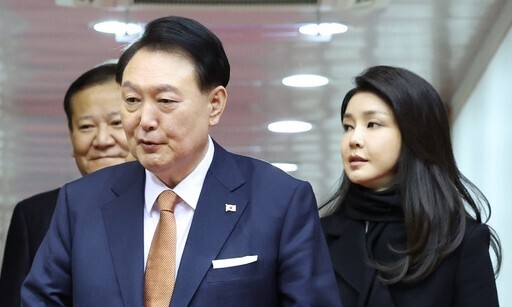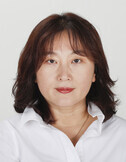hankyoreh
Links to other country sites 다른 나라 사이트 링크
[Column] The clock is ticking for Korea’s first lady


By Kim Young-hee, executive editor
It’s a mystery as to why South Korean President Yoon Suk-yeol chose to have his opening remarks at a Cabinet meeting on Tuesday broadcast live. The overwhelming consensus is that Yoon was the prime cause behind the ruling People Power Party’s humiliating defeat in the recent general election. Yet his remarks did not contain a single apology to the public.
We’ve seen this from Yoon before. When he appeared in a pre-recorded interview with KBS on Feb. 7, at the height of the controversy surrounding first lady Kim Keon-hee’s acceptance of a luxury handbag from a pastor, Yoon did not apologize for his wife’s actions. Then in his address to the nation on April 1, he did not apologize for his mishandling of the conflict between his administration and the medical community.
Naturally, people don’t change very easily. But Yoon’s brazen lack of remorse has defied expectations from within his own camp. It was painful to watch the presidential office do damage control by telling reporters that as soon as the cameras were off, Yoon began his Cabinet meeting by acknowledging his own fault in his party’s defeat.
The next morning, some media outlets reported the possibility of the president selecting his picks for prime minister and chief secretary from the political opposition. Yet if this weren’t a strategic ploy to quell public criticism, his opening remarks for Tuesday’s meeting would have taken a different tone.
Just like the public, every administration wants to be heard, and feels aggrieved when it feels like no one appreciates it. Yet Yoon is on another level. If you sift through his rambling speech, you’ll discover that the gist of it was: “I’m doing my best, so it’s the public’s fault for not seeing that.” But what should we expect from a president who hid his wife from public view for four months to avoid addressing a controversy?
Kim Keon-hee chose to vote early on April 5. She voted in Seoul’s Yongsan District, and was alone when she did so. When word got out on social media, the presidential office was forced to address it. The first lady voting separately from the president — and in secret, at that — is unprecedented. Her plan to remain out of the public eye not only failed but resulted in the spotlight focusing on her even more.
Yoon is everywhere yet nowhere. Broadcasters fearing legal restrictions refer to proposed legislation to assign a special prosecutor to Kim Keon-hee as the “Deutsch Motors special prosecutor bill” or the “first lady special counsel bill.”
As the newly appointed CEO of the now-private broadcaster YTN, Kim Baek’s first act was publicly apologizing for the network’s past inquiries into the first lady. The Election Broadcast Deliberation Commission submitted an official warning to public broadcaster MBC for highlighting the controversy surrounding Kim Keon-hee’s acceptance of a Dior handbag on its “Straight” program. According to the Kyunghyang Shinmun, a member of the committee justified the warning by nitpicking the term “luxury handbag,” as the gift was technically a luxury “pouch.”
There are several political analyses regarding the recent general election, but I view it simply as a public rejection of authoritarianism and reactionary politics. Research from two separate Swedish think tanks, which respectively published their results in March and April, support this theory. The Varieties of Democracy (V-Dem) Institution at the University of Gothenburg published an annual report which said that South Korea’s democratic processes are on a “downward slope” through processes of “autocratization” under the Yoon administration. The report pointed to decreases in press freedom, pointing out that “Greece and Korea are examples that also demonstrate that undermining of freedom of expression and the media are far from reserved for countries that are becoming harsh autocracies.”
The International Institute for Democracy and Electoral Assistance (IDEA) surveyed people from 19 countries for a research report titled, “Perceptions of Democracy.” The report indicates that a significant number of people in various democratic nations are showing preferences for “strong leaders” who disregard democratic processes like parliamentary approval or elections.
South Korea, however, showed a strong distaste for such leaders, with 73% of respondents expressing “extremely unfavorable” perceptions of such leaders. This inherent dislike of authoritarianism was expressed in the massive candlelight protests that led to Park Geun-hye’s impeachment. Although South Korea is currently undergoing political polarization, with an increasing presence of “politics of hate,” the people are still resonantly clear in their rejection of authoritarianism and dictatorships. This was reflected in the recent general election. This is something that the People Power Party needs to take seriously.
The controversy around Kim lies at the heart of Yoon’s authoritarian, my-way-or-the-highway approach to governance, which is exacerbated by his lack of communication with the public and the opposition. None of his predecessors blocked official investigations into family members, yet Yoon did not hesitate in vetoing the bill that would have assigned a special prosecutor to investigate his wife for alleged stock manipulation. When KBS asked him about his intentions to resurrect an executive office tasked specifically with first lady affairs, he resorted to denial.
When Kim Kyung-yul, the former leader of the People Power Party’s emergency response committee, alluded to the first lady as Korea’s “Marie Antoinette,” it resulted in a spat between PPP interim leader Han Dong-hoon and Yoon. In the aftermath of the PPP’s humiliating defeat in last week’s elections, however, Han tucked his tail. It was a definitive moment. An increasing number of Koreans are now nodding their heads at accusations of Yoon using his presidential authority to protect his wife.
The newly founded Rebuilding Korea Party has proposed a new bill that seeks to investigate the first lady not only for alleged stock manipulation involving Deutsch Motors, but for her acceptance of the Dior handbag and for corruption related to a planned expressway from Seoul to Yangpyeong. Even if Yoon succeeds in improving the public’s livelihoods, as he’s promised, it will be difficult for him to keep shielding his wife from prosecution, given the public’s rejection of his administration and the PPP in the general election.
While the most pressing issue is the death of a Marine during a flood rescue operation, the first lady will be back on the agenda when the 22nd National Assembly holds its opening session in late May. Even if he decides to veto the bill again, the Democratic Party holds the parliamentary majority, and will not sit back and idly take the veto.
There isn’t much time for Yoon to act. The more he sits on it, the harder it’s going to get. The only thing that the first lady can do at this point is to apologize to the public and cooperate with investigations. After that, she simply has to wait for the public and the courts’ judgment. Obviously, nobody really expects that to happen. One can only imagine what’s to come.
Please direct questions or comments to [english@hani.co.kr]

Editorial・opinion
![[Editorial] Yoon must halt procurement of SM-3 interceptor missiles [Editorial] Yoon must halt procurement of SM-3 interceptor missiles](https://flexible.img.hani.co.kr/flexible/normal/500/300/imgdb/child/2024/0501/17145495551605_1717145495195344.jpg) [Editorial] Yoon must halt procurement of SM-3 interceptor missiles
[Editorial] Yoon must halt procurement of SM-3 interceptor missiles![[Guest essay] Maybe Korea’s rapid population decline is an opportunity, not a crisis [Guest essay] Maybe Korea’s rapid population decline is an opportunity, not a crisis](https://flexible.img.hani.co.kr/flexible/normal/500/300/imgdb/original/2024/0430/9417144634983596.jpg) [Guest essay] Maybe Korea’s rapid population decline is an opportunity, not a crisis
[Guest essay] Maybe Korea’s rapid population decline is an opportunity, not a crisis- [Column] Can Yoon steer diplomacy with Russia, China back on track?
- [Column] Season 2 of special prosecutor probe may be coming to Korea soon
- [Column] Park Geun-hye déjà vu in Yoon Suk-yeol
- [Editorial] New weight of N. Korea’s nuclear threats makes dialogue all the more urgent
- [Guest essay] The real reason Korea’s new right wants to dub Rhee a founding father
- [Column] ‘Choson’: Is it time we start referring to N. Korea in its own terms?
- [Editorial] Japan’s rewriting of history with Korea has gone too far
- [Column] The president’s questionable capacity for dialogue
Most viewed articles
- 1Months and months of overdue wages are pushing migrant workers in Korea into debt
- 2[Guest essay] Maybe Korea’s rapid population decline is an opportunity, not a crisis
- 3Dermatology, plastic surgery drove record medical tourism to Korea in 2023
- 4Under conservative chief, Korea’s TRC brands teenage wartime massacre victims as traitors
- 5[Column] Can Yoon steer diplomacy with Russia, China back on track?
- 6First meeting between Yoon, Lee in 2 years ends without compromise or agreement
- 7“Korea is so screwed!”: The statistic making foreign scholars’ heads spin
- 8[Editorial] Japan’s rewriting of history with Korea has gone too far
- 9Two factors that’ll decide if Korea’s economy keeps on its upward trend
- 10[Column] For K-pop idols, is all love forbidden love?